Which actors most frequently appear in excellent / awful movies?
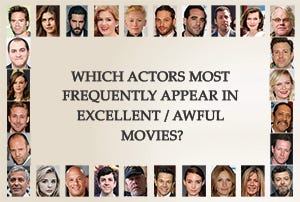
In a previous article, I have looked at the 'brands' of top actors by studying the genres they most frequently appear in.
Today, I am going to look at another facet of an actor's brand: what their presence in a movie signals to the audience about the movie's quality.
Quality is obviously a subjective term and so rather than trying to figure this out myself, I'm going to use two proxies:
Metascore, which is a weighted average of the ratings given by top film critics, as calculated by Metacritic.
IMDb audience rating, which is the score given by IMDb users.
I'll be looking at both measures as these two constituencies - critics and audiences - don't always agree. Critics tend to favour high-brow, dramatic content while looking down on more populist fare such as horror movies. If you see 'quality' as a measure of the artistic merits of a movie, then you may chime more with the views of film critics, whereas if you link quality to audience enjoyment then the IMDb audience scores may make more sense to you. You can read more on that here.
For each measure, I split the movies into five equal groups:
Excellent - The top 20% scoring movies (scoring above 69 from Metascore and above 7.1 from IMDb users).
Good
OK - Middle 20%
Bad
Awful - Lowest 20% of movies (with less than 39 from Metascore and under 5.5 from IMDb users).
Finally, I generated a list of 275 famous actors and actresses, who I will collectively refer to as ‘actors’. All had received high billing in at least ten movies over the past twenty years. See the Note section at the end of this article for my methodology and reason for the gender-neutral noun.
Together, this data allows us to take a snapshot of what film critics and audiences think about the quality of top actors' movies.
And the award for "Most Commonly Starring in Excellent Movies" goes to...
Carey Mulligan is the actor who has spent the highest percentage of her film career in excellent movies, as defined by both critics and audiences. Her movies appear in the top 20% of movies as judged by the Metascore 60% of the time, and 74% of the time, as judged by IMDb users.
Other actors who are worth looking out for include Tilda Swinton, Tom Hardy, Andy Serkis, Ralph Fiennes, and Tom Hanks.
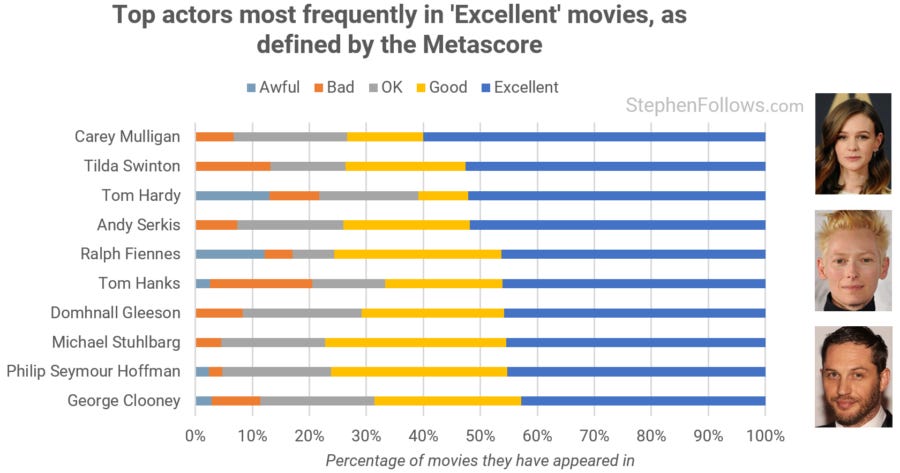
If you prefer audience ratings over those of film critics then you may want to look out for movies starring Ryan Gosling, Michael Stuhlbarg, Benedict Cumberbatch, Leonardo DiCaprio or Emma Watson.
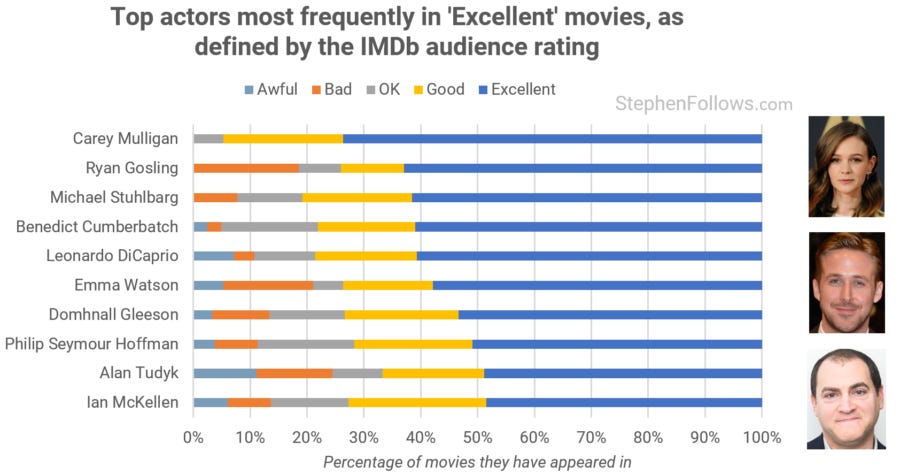
Actors who should act as trigger warnings...
And at the other end of the spectrum, we have actors who are frequently cast in worst-rated movies. Critics dread seeing Alexandra Daddario, Adam Sandler, Milla Jovovich, Kevin Durand and Gerard Butler.
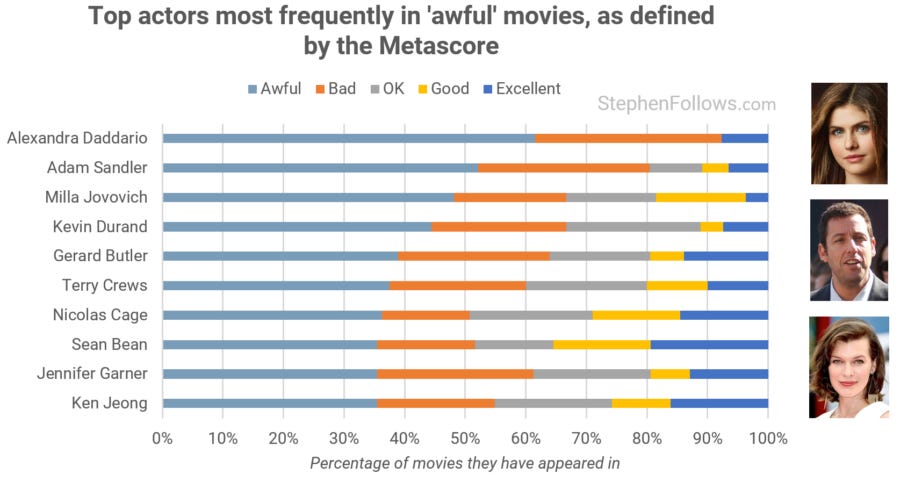
While audiences have a stronger dislike for movies featuring Danny Trejo, Robert Patrick, Billy Burke, Keith David and Ron Perlman.
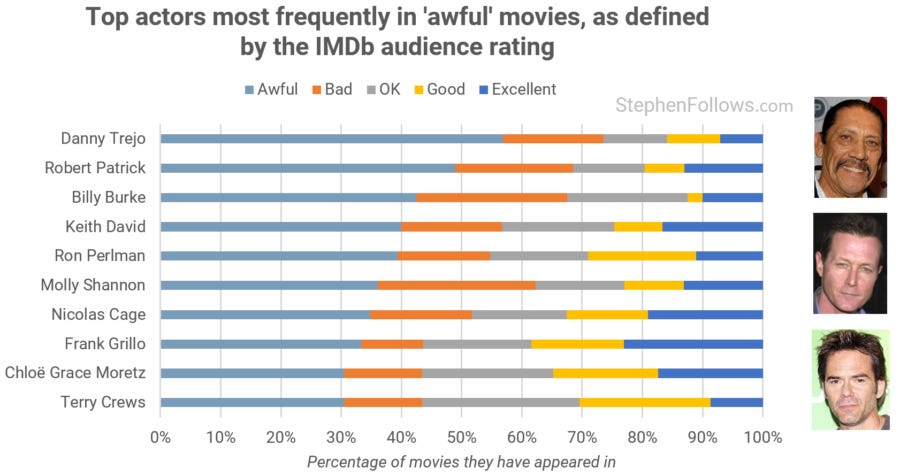
Meh movies
At this point, I know exactly what you're thinking - "Stephen, it's all well and good to know which actors to look out for and which to avoid, but what if I would like a profoundly middling experience?"
I'm glad you asked. I also looked at the actors who most commonly appear in movies which are best described as "Ok, I guess". The cinematic equivalent of a shrug.
Perhaps as a consequence of this search for adequate movies, you're less likely to have heard of the names of the 'OK' lists. Film critics are most apathetic about movies starring Bobby Cannavale and Isla Fisher - both actors who may be better known to fans for their TV work than their movie careers.
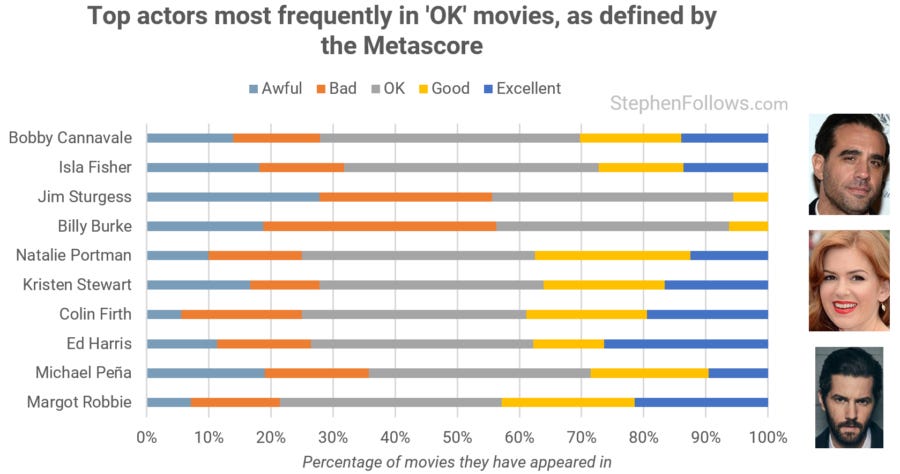
Jason Statham tops the audience indifference poll, with almost half of all his movies being just 'OK', according to film audiences.
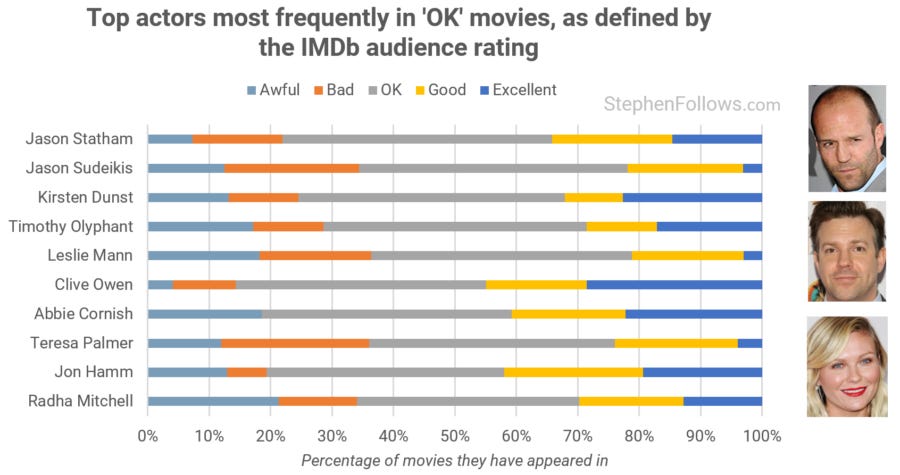
To be clear, I'm not saying that these actors are mediocrity personified. Just that their agents seem to manage to keep them out of bad movies but also out of good ones, too.
Contentious Actors
Finally, I thought it would be interesting to see which performers most divide film critics and audiences.
As you can see from the scatter plot below, the two groups broadly agree - if critics like movies starring a certain actor then there's a good chance that film audiences will too.
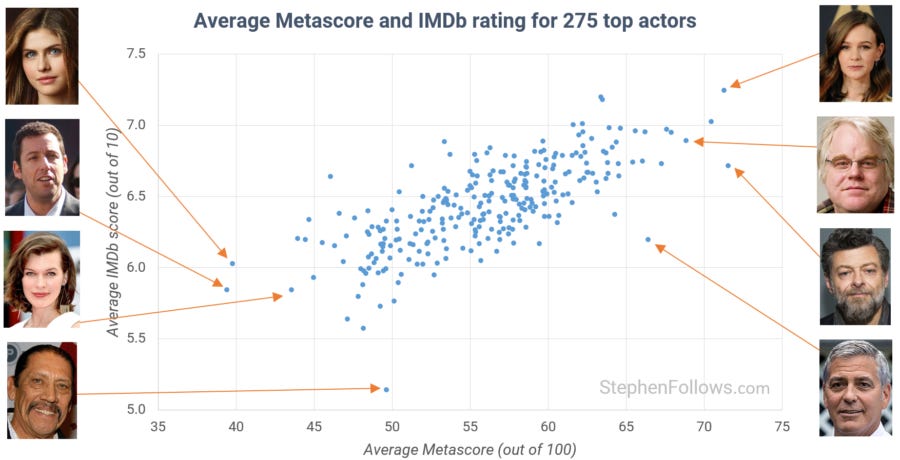
The actor whose movies critics enjoyed disproportionately more than audiences is George Clooney, followed by Brie Larson, Dave Franco and Robert Downey Jr.
At the opposite end of the spectrum (i.e. the actors whose movies audiences like significantly more than critics) are Jim Sturgess, Hugh Jackman, Sean Bean, Chris Evans and Vin Diesel.
Notes
My actors list is all performers who were among the top ten billed names on at least ten movies which were first released in domestic cinemas between 1st January 1999 and 31st December 2018, and who were ranked in the top 5,000 on the IMDb MOVIEmeter. See my previous piece for why I chose this methodology. This produced 275 names, which split into 200 male actors and 75 female actors (why this wasn’t an even gender split is a topic for another day!) With my list of 275 names, I then went back and looked at all the movies they had made during their career, ignoring TV, shorts, music videos and other non-movie output.
I opted for the gender-neutral usage of the word ‘actors’ as I don’t feel that gender has a role to play in the topic at hand. We are looking at the diversity of productions a performer has worked on, and their gender is not a factor. That’s not to say that gender is not a factor for the film industry, as the uneven numbers within the 275 top actors show.
Movie data came from IMDb, Wikipedia and The Numbers. Genre classifications were from IMDb, which meant an average of 2.8 genres per movie.


